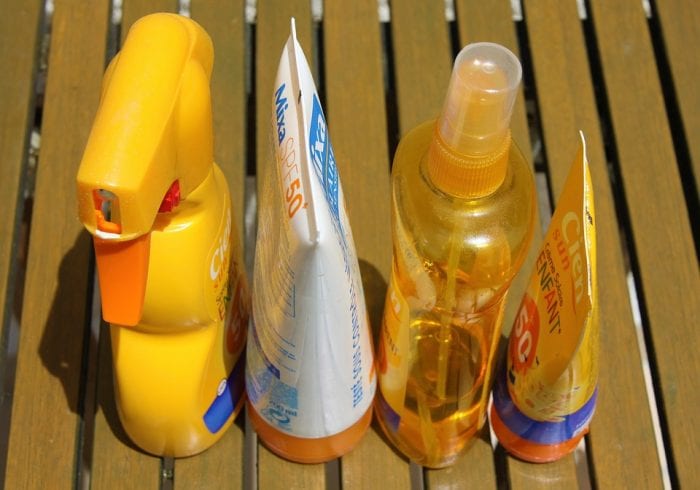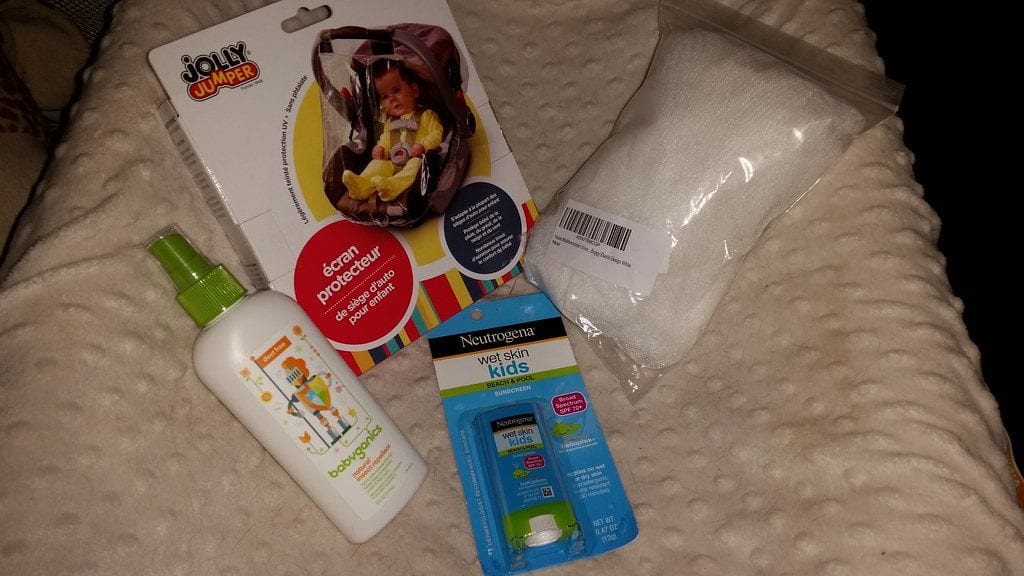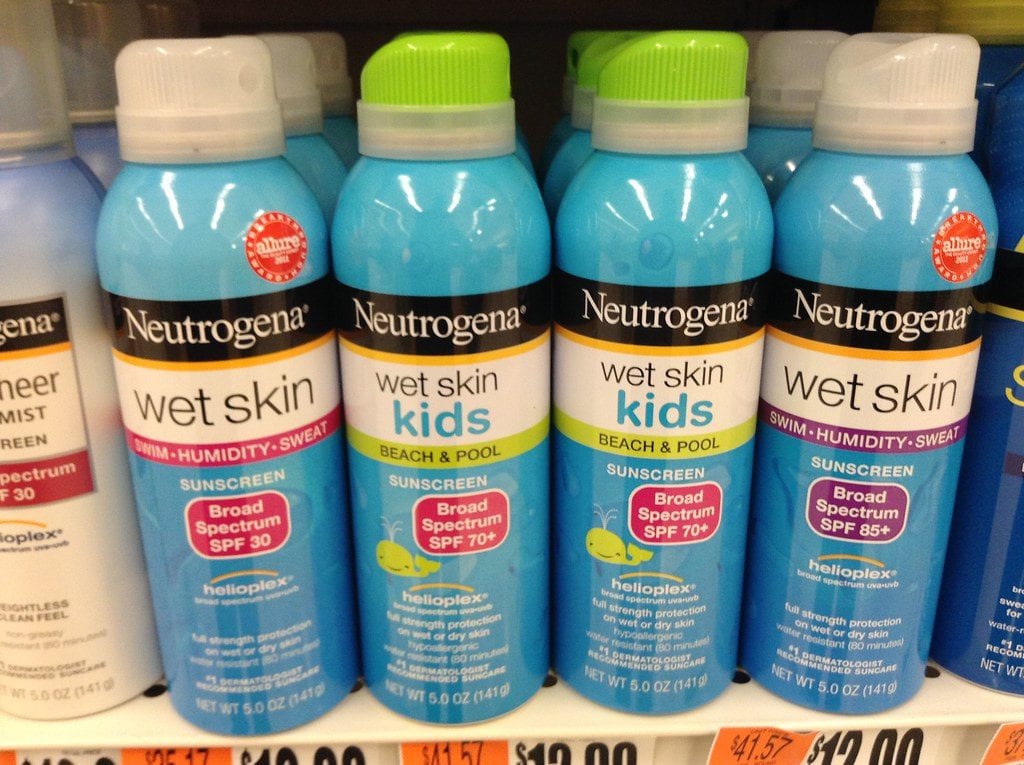Even though it’s September, it’s still hot in many places, and your child may still need sun protection. Whether they’re walking to school or taking a dip in a pool that’s always open, the sun is still brutal in some parts of the country, and they need all the spray they can get.
If you’re a parent, you’ll notice that choosing a sunscreen is a little confusing. There are so many brands of sunscreen available, and they come in many forms. The main two types of sunscreen are the lotion, which is the traditional method, or the spray, which is an aerosol. Many people prefer the latter because it’s more convenient, but is it the right choice? Let’s find out.

Sunscreen Lotion
With sunscreen lotion, you just plop some on your hand, and then you rub it all on the areas that are most sensitive to the sun. Many people find this method a little inconvenient because their hands get messy, and it takes longer to rub it in. However, it’s still the most preferred method for a reason. In this sunscreen spray vs. lotion, sunscreen wins in preference.
Sunscreen Spray
With spray, you apply a mist all over your child’s body, giving them a layer of sunscreen that you don’t have to rub in, or so you think.

The Problem With Sunscreen Spray
In this sunscreen spray vs. lotion comparison, using spray also poses some cons. While the spray option does sound like the most convenient way, with many people skipping the lotion for the spray, it does come with a few problems. Here are a few of them.
- The spray is quite thin. Many people spray the sunscreen on the skin for only a few seconds, and it may not be enough.
- The spray may not be applied evenly. While it does appear at times that you got every part of the skin, the spray may have missed a spot.
- One problem with sprays is that they are fire hazards. Don’t spray it near an open flame, or else you may risk catching something on fire.
- Sprays may irritate a child’s nose and eyes if you spray a little too close to them. You’ll be surprised how far the sprays travel.
Also, you still have to rub in the sprays. When you spray someone, you still need to rub it in a little to make sure the spray goes in. The convenience of a spray goes down the toilet, especially with how you must apply it. The best way to use it is to spray some on your hand, then rub it in, just like a lotion.
While sprays are not dangerous when used correctly, and can still work, they do come with problems that many don’t realize. Some people spray themselves and are surprised when some areas of their skin show burns.
If you have spray on you, you should still use it in the same way as the best lotion for toddler or lotion for teenagers. It even has the same components as a lotion, but the way it’s delivered may be a bit of a concern. So spray it and follow the above directions.
Putting On Sunscreen For Kids
Putting on sunscreen on a kid isn’t much different when compared to an adult. Just rub some lotion on the body parts that are exposed. As for the face, use a sunscreen stick, which can be friendlier towards a face than lotion.
Most kids can handle the sun, but babies should be kept out, even with sunscreen. They are vulnerable and sensitive to sunburns, so make sure that you keep them in at all times.
Even though some sunscreens are “waterproof,” you should still reapply sunscreen every couple of hours to ensure maximum protection. Sometimes, a kid is so wild they take the “waterproof” part of the sunscreen and stretch it until it breaks.

What Is The Best Type Of Sunscreen?
Okay, so we know that lotion is the right way to go, but what brand of sunscreen do you need? It is best to check the labels. If the sunscreen has an SPF of over 30, you should be good to go. The coverage should have around 10 to 15 percent of zinc oxide and about 5 percent or more of titanium oxide for best results.
Other Things To Know About Sunburn
Here are some things to know about sunburn and sunscreen.
- Yes, sunburn is possible even if it’s not hot outside. With sunburn, the rays of the sun play more of a part than the temperature itself.
- You can still get sunburn even if it’s cloudy outside. Many rays always shine through the clouds, and if you’re going to be out without any clothes, it’s vital to apply sunscreen still.
- Having aloe handy in case of sunburn is a good move. You do want to treat the sunburn as soon as possible, as it’s quite irritating. If your kid has it, make sure that they are getting the help they need.
- Kids and teens under 18 are the most vulnerable to sunburn, with over 60 percent of lifetime sunburns happening that age. It’s essential to protect them whenever possible due to their sensitive skin, so keep going.
- Taking a cold bath will help with the sunburn. Make sure to use cold compresses, too.
- It’s okay to take ibuprofen to relieve pain, but make sure it’s for children. There are children’s ibuprofen capsules out there that will do the job, guaranteed.
- While blisters may be tempting to pop, it can end up being painful, and it’s possible to get an infection from them. Avoid popping the blisters whenever possible, and you’ll be good to go.

Sunscreen Spray Vs. Lotion: Conclusion
All year round, you do have to worry about your kids being out in the sun. While the sun does have its peaks during the summertime, it’s still important to take care of, even when the summer is setting. Whichever you choose between sunscreen spray vs. lotion, the most important is that you get the proper sunscreen and protect yourself whenever possible, and you should be good.
Sunscreen Spray Vs. Lotion: FAQs
Last Updated on April 25, 2023 by Harold Chan
DISCLAIMER (IMPORTANT): This information (including all text, images, audio, or other formats on FamilyHype.com) is not intended to be a substitute for informed professional advice, diagnosis, endorsement or treatment. You should not take any action or avoid taking action without consulting a qualified professional. Always seek the advice of your physician or other qualified health provider with any questions about medical conditions. Do not disregard professional medical advice or delay seeking advice or treatment because of something you have read here a FamilyHype.com.